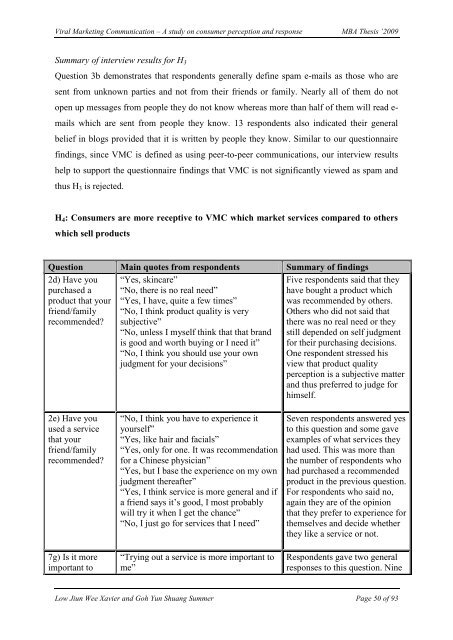Viral Marketing Communication: The Internet Word-of-Mouth
Viral Marketing Communication: The Internet Word-of-Mouth
Viral Marketing Communication: The Internet Word-of-Mouth
You also want an ePaper? Increase the reach of your titles
YUMPU automatically turns print PDFs into web optimized ePapers that Google loves.
<strong>Viral</strong> <strong>Marketing</strong> <strong>Communication</strong> – A study on consumer perception and response MBA <strong>The</strong>sis ’2009<br />
Summary <strong>of</strong> interview results for H 3<br />
Question 3b demonstrates that respondents generally define spam e-mails as those who are<br />
sent from unknown parties and not from their friends or family. Nearly all <strong>of</strong> them do not<br />
open up messages from people they do not know whereas more than half <strong>of</strong> them will read e-<br />
mails which are sent from people they know. 13 respondents also indicated their general<br />
belief in blogs provided that it is written by people they know. Similar to our questionnaire<br />
findings, since VMC is defined as using peer-to-peer communications, our interview results<br />
help to support the questionnaire findings that VMC is not significantly viewed as spam and<br />
thus H 3 is rejected.<br />
H 4 : Consumers are more receptive to VMC which market services compared to others<br />
which sell products<br />
Question Main quotes from respondents Summary <strong>of</strong> findings<br />
2d) Have you<br />
purchased a<br />
product that your<br />
friend/family<br />
recommended<br />
“Yes, skincare”<br />
“No, there is no real need”<br />
“Yes, I have, quite a few times”<br />
“No, I think product quality is very<br />
subjective”<br />
“No, unless I myself think that that brand<br />
is good and worth buying or I need it”<br />
“No, I think you should use your own<br />
judgment for your decisions”<br />
Five respondents said that they<br />
have bought a product which<br />
was recommended by others.<br />
Others who did not said that<br />
there was no real need or they<br />
still depended on self judgment<br />
for their purchasing decisions.<br />
One respondent stressed his<br />
view that product quality<br />
perception is a subjective matter<br />
and thus preferred to judge for<br />
himself.<br />
2e) Have you<br />
used a service<br />
that your<br />
friend/family<br />
recommended<br />
7g) Is it more<br />
important to<br />
“No, I think you have to experience it<br />
yourself”<br />
“Yes, like hair and facials”<br />
“Yes, only for one. It was recommendation<br />
for a Chinese physician”<br />
“Yes, but I base the experience on my own<br />
judgment thereafter”<br />
“Yes, I think service is more general and if<br />
a friend says it‟s good, I most probably<br />
will try it when I get the chance”<br />
“No, I just go for services that I need”<br />
“Trying out a service is more important to<br />
me”<br />
Seven respondents answered yes<br />
to this question and some gave<br />
examples <strong>of</strong> what services they<br />
had used. This was more than<br />
the number <strong>of</strong> respondents who<br />
had purchased a recommended<br />
product in the previous question.<br />
For respondents who said no,<br />
again they are <strong>of</strong> the opinion<br />
that they prefer to experience for<br />
themselves and decide whether<br />
they like a service or not.<br />
Respondents gave two general<br />
responses to this question. Nine<br />
Low Jiun Wee Xavier and Goh Yun Shuang Summer Page 50 <strong>of</strong> 93


